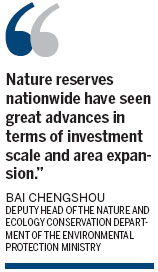Govt backs ecological balance protection

When Bai Chengshou started his career at the Nature and Ecology Conservation Department of the Environmental Protection Ministry in 1997, he had no idea that he was about to witness one of the fastest developing periods in China's nature reserve protection history.
"The flood that hit southern China in 1998 sounded an alarm for the government about what kind of damage the disruption of the ecological balance could bring. Since then, nature reserves nationwide have seen great advances in terms of investment scale and area expansion," said Bai, deputy head of the Nature and Ecology Conservation Department.
Taking local people's benefits into account when managing the reserves, a concept that was gradually recognized by the government, was equally important said Bai, who talked to China Daily about the development of the country's nature reserves, based on his more than 15 years of experience in the field.
A series of policies was introduced to attract original inhabitants in and around nature reserves to join the protection work, encouraging them to lead an environmentally friendly life.
Some were hired as forest rangers, while farmers were given compensation for not using chemicals and for land that had been destroyed by large animals from the reserves, Bai said.
While agreeing that the best situation for life in nature reserves is to have as few interruptions from humans as possible, Bai does not agree with the idea that nature reserves serve only one purpose: protection.
"Reserves that are well managed should form a virtuous cycle with multiple functions, including providing all kinds of resources, supporting scientific research and offering ecotourism, all based on the fundamental function of protection," he said.
A good example is the Honghe National Nature Reserve in Heilongjiang province, crowned as "the land of the Ciconia boyciana", or oriental white stork, by the China Wildlife Conservation Association in 2009.
Built in 1984 and upgraded to a national nature reserve in 1996, the wetland ecosystem mainly conserves wild birds such as oriental white storks, red-crowned cranes and Cygnus cygnus.
The past 30 years have seen a 40-fold increase in oriental white storks in the area, an endangered species under State first-class protection. There are only about 3,000 nationwide. Many plants that once thrived in the wetland but later almost disappeared have also been restored.
There is a research building in the reserve, with a specimen exhibition hall, bird flu monitoring chamber, hydrological information monitoring room and specimen production hall.
"We've conducted national-level joint research with universities and scientific institutions, and have welcomed hundreds of foreign experts from more than 30 countries to study the wetland ecosystem here," said Dong Shubin, head of the reserve management bureau.
He said the reserve has just gained approval to open to tourists and hopes more people can experience the beauty of the wetland.
"Ecotourism has strict criteria in terms of the restricted area open to public, the number of people allowed every day and how the revenue should be used," said Bai, adding that it does not necessarily clash with protection.
Bai said the distribution of the roughly 2,600 nature reserves still needs improvement. "Some regions and species that should be conserved as a nature reserve are not included yet, and some require higher level reserves," he said. "Also, the current reserves mainly serve the conservation of plants, those dedicated to animals, especially large ungulates, are not enough."
Bai called for a national-level development plan to optimize the distribution of nature reserves. Dong's hope is simpler: more investment from the government.
He said the provincial government invested 300,000 yuan ($48,900) a year on the reserve in 2001 when he became head of the bureau. That figure has now reached 1.5 million yuan per year.
wuwencong@chinadaily.com.cn
(China Daily 05/23/2013 page7)


















